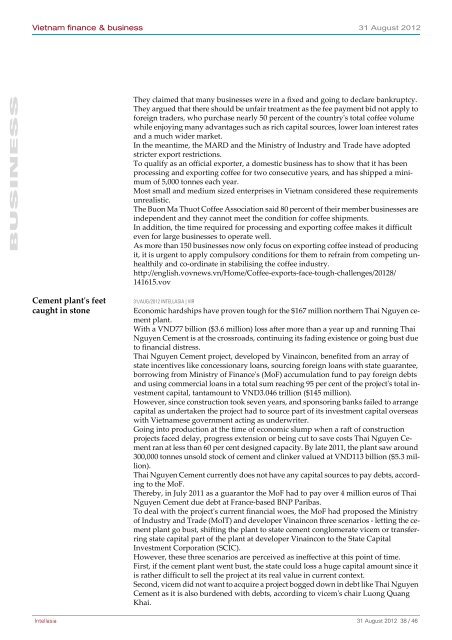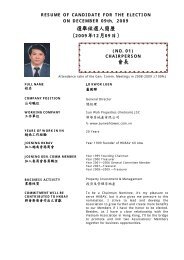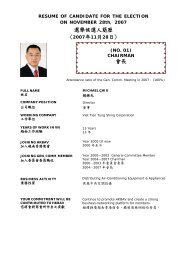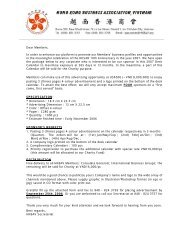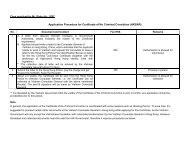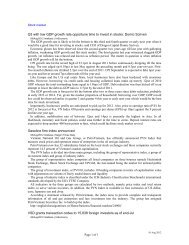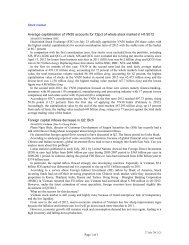31 Aug 2012 Intellasia Finance Vietnam - Hong Kong Business ...
31 Aug 2012 Intellasia Finance Vietnam - Hong Kong Business ...
31 Aug 2012 Intellasia Finance Vietnam - Hong Kong Business ...
Create successful ePaper yourself
Turn your PDF publications into a flip-book with our unique Google optimized e-Paper software.
BUSINESS<br />
<strong>Vietnam</strong> finance & business <strong>31</strong> <strong>Aug</strong>ust <strong>2012</strong><br />
Cement plant's feet<br />
caught in stone<br />
They claimed that many businesses were in a fixed and going to declare bankruptcy.<br />
They argued that there should be unfair treatment as the fee payment bid not apply to<br />
foreign traders, who purchase nearly 50 percent of the country's total coffee volume<br />
while enjoying many advantages such as rich capital sources, lower loan interest rates<br />
and a much wider market.<br />
In the meantime, the MARD and the Ministry of Industry and Trade have adopted<br />
stricter export restrictions.<br />
To qualify as an official exporter, a domestic business has to show that it has been<br />
processing and exporting coffee for two consecutive years, and has shipped a minimum<br />
of 5,000 tonnes each year.<br />
Most small and medium sized enterprises in <strong>Vietnam</strong> considered these requirements<br />
unrealistic.<br />
The Buon Ma Thuot Coffee Association said 80 percent of their member businesses are<br />
independent and they cannot meet the condition for coffee shipments.<br />
In addition, the time required for processing and exporting coffee makes it difficult<br />
even for large businesses to operate well.<br />
As more than 150 businesses now only focus on exporting coffee instead of producing<br />
it, it is urgent to apply compulsory conditions for them to refrain from competing unhealthily<br />
and co-ordinate in stabilising the coffee industry.<br />
http://english.vovnews.vn/Home/Coffee-exports-face-tough-challenges/<strong>2012</strong>8/<br />
141615.vov<br />
<strong>31</strong>/AUG/<strong>2012</strong> INTELLASIA | VIR<br />
Economic hardships have proven tough for the $167 million northern Thai Nguyen cement<br />
plant.<br />
With a VND77 billion ($3.6 million) loss after more than a year up and running Thai<br />
Nguyen Cement is at the crossroads, continuing its fading existence or going bust due<br />
to financial distress.<br />
Thai Nguyen Cement project, developed by Vinaincon, benefited from an array of<br />
state incentives like concessionary loans, sourcing foreign loans with state guarantee,<br />
borrowing from Ministry of <strong>Finance</strong>'s (MoF) accumulation fund to pay foreign debts<br />
and using commercial loans in a total sum reaching 95 per cent of the project's total investment<br />
capital, tantamount to VND3.046 trillion ($145 million).<br />
However, since construction took seven years, and sponsoring banks failed to arrange<br />
capital as undertaken the project had to source part of its investment capital overseas<br />
with <strong>Vietnam</strong>ese government acting as underwriter.<br />
Going into production at the time of economic slump when a raft of construction<br />
projects faced delay, progress extension or being cut to save costs Thai Nguyen Cement<br />
ran at less than 60 per cent designed capacity. By late 2011, the plant saw around<br />
300,000 tonnes unsold stock of cement and clinker valued at VND113 billion ($5.3 million).<br />
Thai Nguyen Cement currently does not have any capital sources to pay debts, according<br />
to the MoF.<br />
Thereby, in July 2011 as a guarantor the MoF had to pay over 4 million euros of Thai<br />
Nguyen Cement due debt at France-based BNP Paribas.<br />
To deal with the project's current financial woes, the MoF had proposed the Ministry<br />
of Industry and Trade (MoIT) and developer Vinaincon three scenarios - letting the cement<br />
plant go bust, shifting the plant to state cement conglomerate vicem or transferring<br />
state capital part of the plant at developer Vinaincon to the State Capital<br />
Investment Corporation (SCIC).<br />
However, these three scenarios are perceived as ineffective at this point of time.<br />
First, if the cement plant went bust, the state could loss a huge capital amount since it<br />
is rather difficult to sell the project at its real value in current context.<br />
Second, vicem did not want to acquire a project bogged down in debt like Thai Nguyen<br />
Cement as it is also burdened with debts, according to vicem's chair Luong Quang<br />
Khai.<br />
<strong>Intellasia</strong> <strong>31</strong> <strong>Aug</strong>ust <strong>2012</strong> 38 / 46


